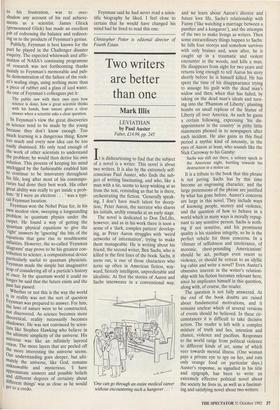Two writers are better than one
Mark Illis
LEVIATHAN by Paul Auster Faber, £14.99, pp. 245 It is disheartening to find that the subject of a novel is a writer. This novel is about two writers. It is also by the extremely self- conscious Paul Auster, who finds the sub- ject of writing fascinating, and who, like a man with a tic, seems to keep winking at us from the text, reminding us that he is there, orchestrating the fiction. 'Generally speak- ing, I don't have much talent for decep- tion,' Peter Aaron, the narrator who shares his initials, archly remarks at an early stage.
The novel is dedicated to Don DeLillo, however, and as in his work there is soon a sense of a 'dark, complex pattern' develop- ing, as Peter Aaron struggles with 'weird networks of information', trying to make them manageable. He is writing about his friend, the second writer, Ben Sachs, who is killed in the first lines of the book. Sachs, it turns out, is one of those characters who turns up often in American fiction, way- ward, fiercely intelligent, unpredictable and idealistic. At first the stories of Aaron and Sachs interweave in a conventional way, `One can go through an entire medical career without encountering such a hangover . . . ' and we learn about Aaron's divorce and future love life, Sachs's relationship with Fanny (like watching a marriage between a panther and a kangaroo'), and the attempts of the two to make livings as writers. Then some extraordinary things happen to Sachs: he falls four storeys and somehow survives with only bruises and, soon after, he is caught up in a traumatic and violent encounter in the woods, and kills a man.
He disappears from sight for two years and returns long enough to tell Aaron his story shortly before he is himself killed. He has spent the time of his disappearance trying to assuage his guilt with the dead man's widow and then, when that has failed, by taking on the dead man's ideals and turn- ing into the 'Phantom of Liberty', planting bombs on small replicas of the Statue of Liberty all over America. As such he gains a certain following, expressing 'his dis- appointment in the country' in pithy little statements phoned in to newspapers after each incident. He also gains in this final period a mythic kind of intensity, in the eyes of Aaron at least, who sounds like the Nick Carroway to his Gatsby:
Sachs was still out there, a solitary speck in the American night, hurtling towards his destruction in a stolen car.
It is a tribute to the book that this phrase is not jarring. Sachs has by this time become an engrossing character, and the large pretensions of the phrase are justified by what has gone before. Auster's concerns are large in this novel. They include ways of knowing people, secrecy and violence, and the question of how to behave in a world which in many ways is morally repug- nant to any sensitive person. Sachs is noth- ing if not sensitive, and his prominent quality is his stainless integrity, so he is the perfect vehicle for these concerns. In a `climate of selfishness and intolerance, of moronic, chest-pounding Americanism' should he act, perhaps even resort to violence, or should he retreat to an idyllic log cabin and write a novel? Even Auster's obsessive interest in the writer's relation- ship with his fiction becomes relevant here, since he implicates himself in this question, along with, of course, the reader. The question is not fully answered. At the end of the book doubts are raised about fundamental motivations, and it remains unclear which of several versions of events should be believed. In these cir- cumstances it is difficult to take decisive action. The reader is left with a complex mixture of truth and lies, intention and chance, violence and pacifism. Responses to the world range from political violence to different kinds of art, some of which veer towards mental illness. (One woman pays a private eye to spy on her, and eats only orange food on particular days.) Auster's response, as signalled in his title and epigraph, has been to write an extremely effective political novel about the society he lives in, as well as a fascinat- ing and satisfying novel about two writers.


























































 Previous page
Previous page